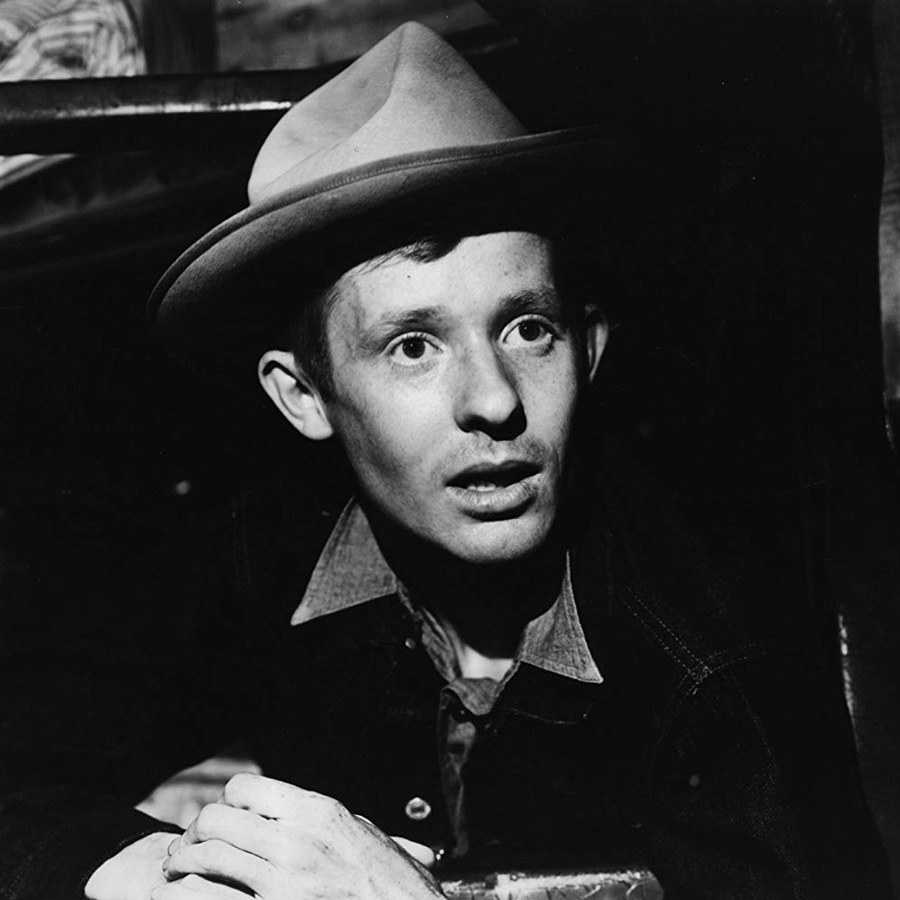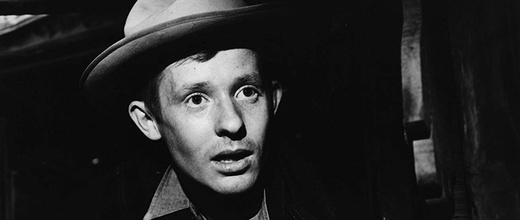The views expressed in our content reflect individual perspectives and do not represent the authoritative views of the Baha'i Faith.
Would you leave the life of a successful Hollywood and Broadway star to devote your days to a life of the spirit? O. Z. Whitehead did.
Welcome to Uplifting the World of Being, a new series where we’ll learn about Baha’is
who made their mark on history through their creative and artistic pursuits:
Arts, crafts and sciences uplift the world of being, and are conducive to its exaltation. Knowledge is as wings to man’s life, and a ladder for his ascent. – Baha’u’llah, Epistle to the Son of the Wolf, p. 26.

O.Z. Whitehead
On Broadway and in Hollywood, Oothout Zabriskie Whitehead, better known as “Zebby” or “O.Z.,” had an incredibly successful acting career and a close relationship with Katherine Hepburn, the leading lady of American film in its golden era—but he ultimately left both of them behind for a greater love, his deep connection to the Baha’i Faith.
Among his more than 60 film and television credits, and countless theatre performances in major Broadway venues, you might remember Zebby best as Al Joad, in John Ford’s 1940 film adaptation of John Steinbeck’s novel Grapes of Wrath.
Zebby became a devout Baha’i shortly after he first encountered the Faith in 1949 at the age of 38, at the height of his career as an actor. He dearly loved his craft, but his love for the Baha’i Faith exceeded that passion, and he spent the second half of his life devoted to its teachings.
Born in Manhattan on March 1, 1911, Zebby grew up in a world of privilege and luxury. His father, a wealthy banker, regularly took his son to the elite theatres and cinemas of New York City, exposing him to the world of Hollywood from a young age. He grew fascinated by films that featured his comic heroes and by the age of 10 Zebby decided to become an actor.
Following his graduation from an elite Boston boarding school, Zebby attended Harvard University where he became close friends with Dick Hepburn, brother to Katharine Hepburn. His new found friendship with the Hepburn’s exposed him to a new world of serious Broadway theatre, and Katherine became a great source of encouragement to Zebby. After only three years at Harvard, and much to his mother’s disapproval, Zebby decided to leave college in pursuit of acting. His career debut began in 1933, in a theatrical performance of The Lake. In 1935, Zebby made his first appearance on the silver screen in Ben Hecht’s film The Scoundrel, which won an Oscar for Best Original Story in 1936.
 The Hepburns continued their friendship with Zebby and introduced him to many of their friends in the movie world, including John Ford, the famous Hollywood director. Soon after their introduction, Ford called Zebby to Hollywood to play a vital role as Tom Joad’s younger brother Al in his film adaptation of Grapes of Wrath. The film won several awards, including two Oscars in 1941. Zebby’s performance in Grapes of Wrath earned him membership in Ford’s famous “stock company” of character actors, a group that included John Wayne, Ward Bond and Alan Mowbray.
The Hepburns continued their friendship with Zebby and introduced him to many of their friends in the movie world, including John Ford, the famous Hollywood director. Soon after their introduction, Ford called Zebby to Hollywood to play a vital role as Tom Joad’s younger brother Al in his film adaptation of Grapes of Wrath. The film won several awards, including two Oscars in 1941. Zebby’s performance in Grapes of Wrath earned him membership in Ford’s famous “stock company” of character actors, a group that included John Wayne, Ward Bond and Alan Mowbray.
Despite his peaceful disposition and early membership in an anti-war group, Zebby enlisted in the Second World War—but curvature of the spine protected him from service in combat. Zebby returned to Hollywood following the end of the war and continued to make appearances with supporting roles on both film and television throughout the 40’s. However, Zebby grew increasingly frustrated with the Hollywood “studio system,” and that disillusionment led him to begin his search for a more purposeful life:
But the life of man is not so restricted; it is divine, eternal, not mortal and sensual. For him a spiritual existence and livelihood is prepared and ordained in the divine creative plan. His life is intended to be a life of spiritual enjoyment to which the animal can never attain. This enjoyment depends upon the acquisition of heavenly virtues. The sublimity of man is his attainment of the knowledge of God. The bliss of man is the acquiring of heavenly bestowals, which descend upon him in the outflow of the bounty of God. The happiness of man is in the fragrance of the love of God. This is the highest pinnacle of attainment in the human world. – Abdu’l-Baha, The Promulgation of Universal Peace, p. 184
Following a conversation at a cafe on Sunset Boulevard, Zebby accepted an invitation to a Baha’i fireside, an informal meeting where he could learn more about the Baha’i Faith. Although Zebby hadn’t given religion much thought, the presentation given by a Baha’i speaker named Marzieh Gail impressed him:
Some clergymen whom I had met often conveyed to me from their remarks that they considered themselves at least better educated and probably more mature than their congregations or their listeners. Mrs. Gail, on the contrary, spoke as if she felt privileged to share with those present some of her thoughts on the Baha’i Revelation. – O. Z. Whitehead, in Annamarie Honnold’s Why They Became Baha’is, p. 206.
In 1950, following further exploration, Zebby declared his faith in Baha’u’llah. In 1955, Zebby undertook his first Baha’i pilgrimage to the Holy Land in Haifa, Israel. There he met the Guardian of the Baha’i Faith, Shoghi Effendi, who inspired him to travel and support the growth of Baha’i communities in other parts of the world. Eight years later he left the United States and his acting career there, and moved to Dublin, Ireland, following a trip to London where he attended the first Baha’i World Congress in 1963. In Ireland, he spent the last 30 years of his life writing popular Baha’i-inspired books, strengthening the Baha’i community there, enthusiastically teaching the Baha’i Faith to others, and occasionally acting in Irish theatre.
Zebby served on the Local Spiritual Assembly of Dublin and was elected to the first Baha’i National Spiritual Assembly of Ireland in 1972. He supported Irish Actors’ Equity and the Screen Actors’ Guild in Ireland, and served on the executive committee of the Irish branch of PEN (which stands for “Poets, Essayists and Novelists”) International.
Whitehead decided, as his focus shifted from acting to writing, to write books that chronicled the lives of prominent early Baha’is—many who he knew personally. By the end of his life, Zebby had published three volumes that chronicled the lives of early believers of the Baha’i Faith: Some Early Baha’is of the West (1976), Some Baha’is to Remember (1983), and Portraits of Some Baha’i Women (1996).
Zebby’s detachment from a life of stardom, his commitment to the Baha’i Faith, and his passion for storytelling enabled him to teach and inspire all those who crossed his path. Revered as a great source of knowledge to the Baha’i community of Ireland, Zebby devoted the final three and a half decades of his life to nurturing that community and contributing to Baha’i journals and publications around the world.
Beyond all that, to those who made his acquaintance and became his friends, he was a quietly-spoken, inspirational figure, a gentle and loving teacher whose regular Sunday night fireside meetings helped to confirm many as Baha’is. – Cited in Baha’i Studies Review 8, O. Z. Whitehead (1911-1998), by Robert Weinberg.
The renowned actor and writer O. Z. Whitehead passed away in Dublin on July 29, 1998 at the age of 87. Upon his passing, the Universal House of Justice cabled the Baha’i world, saying:
HIS LONG YEARS SELF-SACRIFICING DEVOTION TO THE CAUSE OF GOD, HIS OUTSTANDING CONTRIBUTION TO THE ADVANCEMENT OF THE IRISH BAHÁ’Í COMMUNITY, HIS CHAMPIONSHIP OF THE ARTS, HIS PUBLISHED ACCOUNTS OF LIVES DISTINGUISHED FELLOW-BELIEVERS, ALL CONSTITUTE IMPERISHABLE RECORD LIFE OF EXEMPLARY SERVICE …

















Comments
Sign in or create an account
Continue with Facebookor